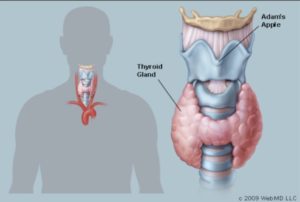By Cat Troiano
According to the American Thyroid Association, roughly 20 million Americans are affected by thyroid disease. As many as 12 million of those individuals are unaware of their thyroid condition. Performing a TSH test is essential for diagnosing common thyroid conditions and preventing serious consequences that can result from untreated thyroid disease.
What Is TSH?
The thyroid gland, situated in front of the trachea at the lower portion of the neck, is responsible for producing thyroid hormones that aid in regulating metabolism and other bodily functions, such as heart rate, respiration, digestion and temperature. Thyroid-stimulating hormone (TSH) is produced in the pituitary gland, which is located at the base of the brain. TSH stimulates the thyroid gland’s production of thyroid hormones, which include:
• Thyroxine
• Thiiodothyronine
• Calcitonin
The TSH test evaluates the level of TSH in the blood. The result of the TSH test enables physicians to diagnose thyroid disease. The TSH test is also valuable in monitoring the management of thyroid disease.
The TSH test is performed on the serum from a blood sample. No fasting or other special preparation is required for the TSH test. However, certain medications, including prednisone, oral contraception, potassium iodide, dopamine, lithium, biotin supplementation and medications used to treat thyroid disease, can interfere and produce inaccurate results. The normal reference range for TSH levels is 0.4 to 4.0 milli-international units per liter.
What Does a High TSH Test Result Indicate?
When the TSH test result reads higher than the normal reference range, this means that the pituitary gland is producing too much TSH in an effort to stimulate an increase in thyroid hormone production. A high TSH result is indicative of hypothyroidism.
Hypothyroidism, defined as underactive thyroid, is the condition in which the thyroid gland produces insufficient thyroid hormones. Common signs and symptoms of hypothyroidism include weight gain, lethargy, forgetfulness, sensitivity to cold temperatures, dry hair and skin, depression and constipation. Hypothyroidism can be managed with oral synthetic thyroid hormone supplementation.
Hashimoto’s disease is an autoimmune disease in which the body’s immune cells attack the thyroid gland, resulting in hypothyroidism. Iodine deficiency is another potential cause of hypothyroidism since the thyroid gland relies on iodine for hormone production.
What Does a Low TSH Result Indicate?
If the TSH test result reads lower than the normal reference range, the pituitary gland is producing less TSH in response to high levels of thyroid hormones already in circulation. A low TSH result is indicative of hyperthyroidism.
Hyperthyroidism, defined as overactive thyroid, is the condition in which the thyroid gland produces excessive amounts of thyroid hormones. Common signs and symptoms of hyperthyroidism include weight loss, nervousness, irritability, vision problems and rapid heart rate. Hyperthyroidism is typically controlled with antithyroid medications or with radioactive iodine treatment.
Grave’s disease is an autoimmune disorder in which the body’s immune cells attack the thyroid gland, leading to hyperthyroidism. Another cause of hyperthyroidism is the presence of thyroid nodules, which are lumps that form on the thyroid gland. Although roughly 15 percent of all thyroid nodules are cancerous, according to the American Cancer Society, nodules that cause hyperthyroidism are nearly always benign.
Additional Screening Options
Additional thyroid function tests may be ordered to measure levels of free and active thyroid hormones in the blood. Results of these additional tests, combined with that of the TSH test, can provide a more complete picture of how efficiently the pituitary and thyroid glands are working together. These tests include:
• T4 and FT4, which check thyroxine levels
• T3 and FT3, which evaluate triiodothyronine levels
Depending on a patient’s symptoms, medical history, risk factors, laboratory test results and physical examination findings, diagnostic imagery, such as ultrasound or a radioiodine scan, may also be ordered to rule out or confirm the presence of thyroid nodules.
Test Now to Prevent Consequences Later
Individuals who have undetected thyroid disease carry the risks of serious health complications. Some of these complications include:
• Osteoporosis
• Heart disease
• Nerve damage
• Respiratory problems, including sleep apnea
• Reproductive problems, including infertility, miscarriage, preterm delivery and birth defects
• Thyroid storm, a potentially life-threatening event in which a large quantity of thyroid hormone is secreted into the blood within a short time period
Prevent these consequences by ordering TSH tests on all patients who present with potential symptoms of thyroid disease and on those with risk factors for developing these manageable conditions.
 Image: WebMD, LLC
Image: WebMD, LLC